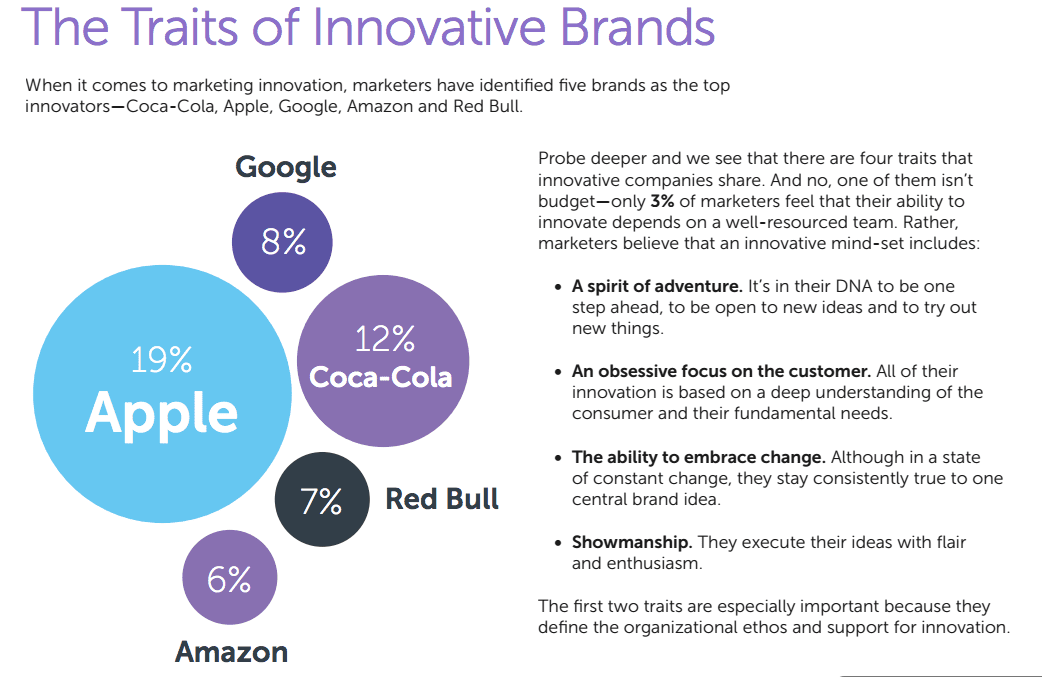5 key themes of Modern Marketing innovation
Innovation is a concept that is referenced regularly in marketing content: from blog posts to keynotes, it is widely acknowledged as a critical ingredient for success in the digital age. Yet, for all the importance attributed to innovation, it is rarely analysed or explored.
We decided to take a closer look to understand how marketers perceive innovation both inside and outside their own organisations. How do marketers define innovation? What are the main enablers of innovation? Do they feel their own marketing is innovative? We wanted to answer these questions, and more, to understand the key drivers and challenges. We went about doing this by surveying the attendees of our 2014 UK Roadshow in London. This group was made-up of senior-level marketers, representing a wide variety of sectors; both consumer and business-to-business.
The Five Key Marketing Innovation themes
From the survey results, we distilled five key themes, some of which conform to expectation with others more surprising. Lets take a closer look at those themes:
- Theme 1: Knowing your customer or prospect is the most powerful driver of innovation: When asked to rank what were the most important enablers of innovation, a large percentage of marketers (46%) felt that a deep understanding of the target market is the single most important requirement in driving innovation. An obsessive focus on the customer is vital in driving innovation in marketing. This was the most popular choice; far out-performing things like risk-taking and executive backing.
- Theme 2: Innovation is widely accepted as having great importance in marketing: Nearly half (44%) of respondents suggested innovation as ‘very important’, with a further 36% reporting it as ‘important’. Putting those results together suggests that a large majority of marketers acknowledge the importance of innovation.
- Theme 3: Consumer brands are still perceived to be more innovative: To get a sense of how marketers perceive marketing innovation, we asked them to identify organisations they felt were leading the way with their marketing. A total of 74% of the companies identified market directly to consumers. Brands like Apple, Coca-Cola and Red Bull were some of the more popular choices but the message was clear; innovation is still seen as the domain of the consumer brand.

- Theme 4: Culture is a key barrier to innovation: The urge to innovate is being constrained. Only 1 in 10 (10%) find their organisations’ marketing is innovative. The ‘average’ marketer finds his or her own innovation blocked by a risk-averse culture (77% describe their company culture in this way).
- Theme 5: Technology, research and integration – the priority areas for marketing innovation: If marketers could innovate freely in any area, they would prioritize three things:(i) marketing automation and technology,(ii) market research and insight, and(iii) multi-channel integrated campaigns.
What the survey results clearly demonstrate is that marketers believe that they can innovate by focusing their energy on engagement with their customers.
In their view, knowing their customer is the highest priority in a marketing organisation looking to foster innovation. Supporting this shift to engagement marketing, marketers would prioritise investment in technology, research and integration. This would allow for the ‘single-view’ of the customer to be developed, which enables truly responsive and engaging conversations to take place with those customers.
To read the full report including an assessment of types of innovator, download the Marketing Innovation report.
Thanks to Ray Coppinger of Content Partner
Marketo for sharing their thoughts and opinions in this blog post, and their whitepaper on Engagement Marketing. You can connect with their Online Marketing Manager Ray Coppinger on
LinkedIn.








